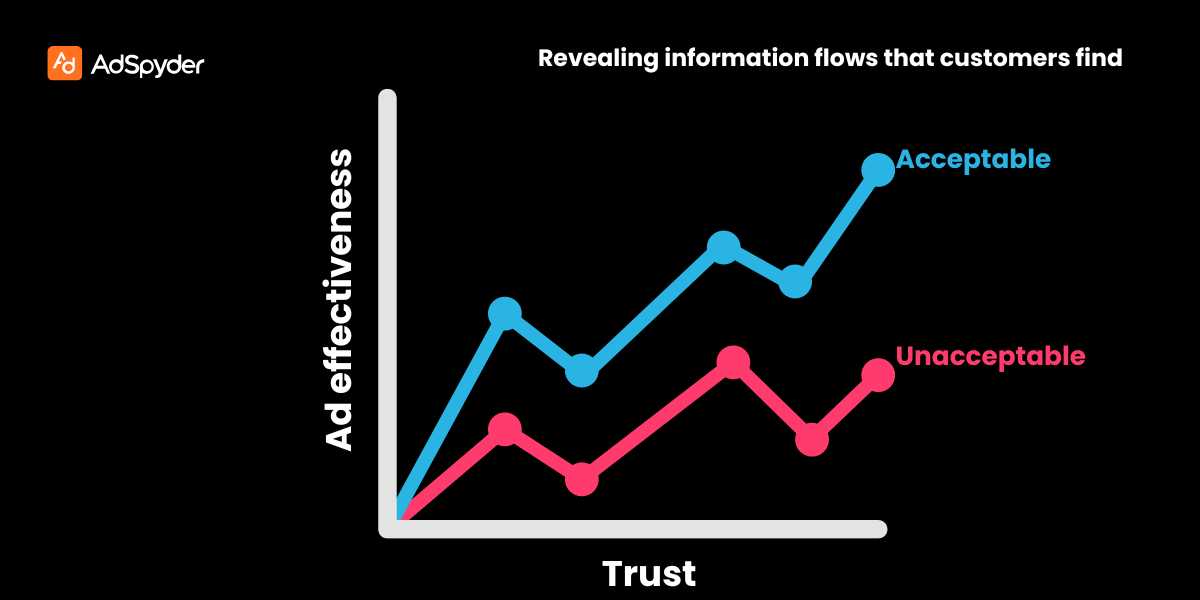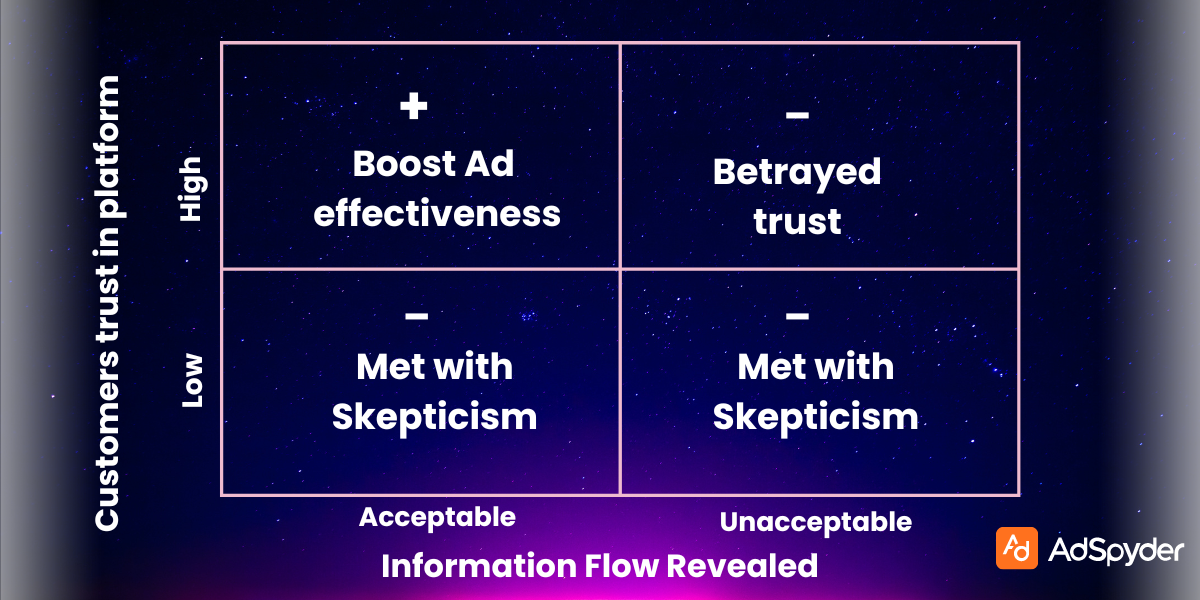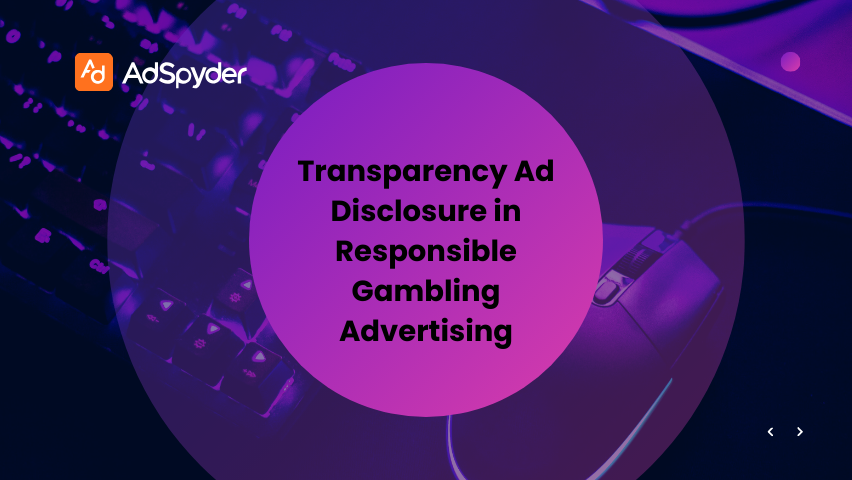Ready to Elevate your Marketing Strategy?
Transparency and ad disclosure serve as the cornerstones of responsible gambling advertising. In an industry that attracts a diverse range of users, advertisers must prioritize trustworthiness by crafting clear and honest ad campaigns. In this comprehensive guide, we will delve into the paramount importance of transparent and honest advertisements, the significance of transparently disclosing terms and conditions, the role of presenting responsible gambling information, and the necessity of obtaining user consent and disclosing data collection practices.
Clear and Honest Ad Disclosure
Ad tranparency and Ad platform Trust

The bedrock of transparency lies in the creation of clear and honest advertisements, including ad disclosure. Advertisers must ensure that their ad content faithfully represents the products or services they offer. Utilizing Video Testimonials in Marketing can decorate trust with via presenting real user stories and true feedback. The employment of deceptive or misleading tactics, such as concealing vital information or exaggerating claims, can lead to a loss of user trust and a tarnished brand image.
82% of consumers consider transparency regarding the price and terms of a product or service to be essential in building trust.
Avoiding Deceptive or Misleading Practices
Unlocking the Upside of Transparency:

Deceptive practices, such as concealing vital information or exaggerating claims, must be unequivocally avoided, especially in Facebook ad disclosure and Google ad disclosure. Advertisers must adopt a forthright approach, explicitly addressing the limitations and risks associated with gambling activities. This approach empowers users to make informed choices.
AI chat in customer service can also play a key function in clarifying phrases and situations for clients, making sure they completely apprehend the ad content material or product offerings
74% of consumers believe that companies must be transparent about the origin and production methods of their products.
Disclosure of Terms and Conditions
The transparent disclosure of terms and conditions, including ad transparency in betting, stands as a pivotal facet of responsible gambling advertising. Users should have ready access to comprehensible terms and conditions concerning promotions, bonuses, and other offers. This ensures that users are well-informed about any prerequisites or restrictions before engaging with the advertised content. Repurposing content into simplified formats, such as explainer videos or infographics, can help users better understand these terms
68% of consumers emphasize the importance of clear disclosure of charges in building trust.
Making Disclosures Accessible and Understandable
Merely providing terms and conditions is insufficient; they must be presented in a manner that is accessible and comprehensible to users, avoiding complex jargon. Advertisers can employ plain language to ensure that users can easily grasp the information presented without any confusion.
73% of consumers contend that complete transparency in business practices results in heightened trust.
Displaying Responsible Gambling Information
Incorporating responsible gambling messages into ad campaigns underscores the advertiser’s unwavering commitment to promoting responsible gambling behavior. Advertisements should encompass information concerning the risks of gambling, helpline numbers for problem gamblers, and resources for seeking assistance and support. 78% of consumers assert that gambling ads should incorporate responsible gambling messages.
Table: Responsible Gambling Information
| Information Type | Best Practice | Purpose |
| Age Restriction | Display “18+” prominently on all gambling ads | Prevents underage audiences from engaging in gambling |
| Gambling Helpline | Include a helpline number for problem gambling | Offers immediate support to individuals in need |
| Self-Exclusion Options | Mention self-exclusion tools in ads | Helps vulnerable users limit or exclude gambling activity |
| Responsible Gambling Logo | Add a recognizable logo (e.g., BeGambleAware) | Promotes awareness and credibility |
| Link to Gambling Resources | Include a link to responsible gambling resources | Provides educational materials on safe gambling habits |
| Deposit and Bet Limits | Promote the availability of deposit/bet limits | Encourages users to gamble within their financial limits |
| Terms and Conditions Disclosure | Display clear terms and conditions for bonuses | Ensures transparency and prevents misleading promotions |
Demonstrating Commitment to Responsible Advertising Practices
The inclusion of responsible gambling information not only empowers users to make informed choices but also demonstrates the advertiser’s dedication to responsible advertising practices. This not only cultivates a positive brand image but also attracts users who prioritize responsible gambling.
88% of U.S. marketers have reported experiencing measurable improvements because of personalization, with over half reporting a boost greater than 10%.
User Consent and Data Collection Disclosure
User consent plays a pivotal role when collecting data for ad targeting purposes, including ad transparency. Advertisers must obtain explicit consent from users before collecting any personal information, coupled with transparently informing users about how their data will be employed in ad campaigns.
91% of consumers exhibit a greater inclination to shop with brands that furnish personalized offers and recommendations.
Table: User Consent and Data Collection Disclosure
This table outlines best practices for disclosing how user data is collected, stored, and used in ads.
| Disclosure Element | Best Practice | Purpose |
| Consent Mechanism | Use clear opt-in checkboxes for data collection | Ensures users voluntarily agree to data collection |
| Cookie Policy | Display a cookie consent banner | Informs users about the data tracking methods used on the site |
| Data Usage Transparency | Clearly state how user data will be used | Builds trust by explaining data usage, including for targeted ads |
| Third-Party Sharing | Disclose any third-party data sharing | Ensures transparency regarding how personal data is shared with advertisers |
| Opt-Out Options | Provide easy-to-find opt-out options for tracking | Allows users to opt-out of targeted ads and data collection |
| Data Retention Periods | Clearly mention how long data will be stored | Keeps users informed on how long their data is held |
| Access to Privacy Policy | Provide a direct link to a detailed privacy policy | Gives users full transparency about their data rights and protections |
Informing Users about Data Usage
Besides obtaining consent, advertisers should provide users with clear and concise information regarding data usage. Users must have a comprehensive understanding of how their data will be utilized to deliver personalized ads while simultaneously being assured of their privacy protection. 86% of consumers assert that transparency from businesses has assumed heightened importance.
Here are some important ways to implement this:
Clear Consent
Ensure users give explicit consent for data collection, particularly for cookies or third-party tracking.
- Use a straightforward opt-in mechanism rather than pre-checked boxes.
- Having a straightforward approach by taking consent. you build trust with your customers and allow them a chance to opt out or modify the terms to their liking.
- This also ensures legal protection for your brand.
Explain Data Usage
Inform users about how they will use their data, such as for personalizing ads, retargeting, or enhancing their user experience.
- This builds transparency and helps users feel secure about their privacy.
- Clearly define the scope of data usage – what will be collected, what can be done with the data and what improvements can eb made using this data to the platforms.
Third-Party Sharing
Clearly disclose if you will share data with third parties, such as ad networks or external partners, and for what purposes.
- Having this provides customers to assess whether they are ready to provide access to this data for third-party sharing.
- Also create an option (if possible) on how this third-party data sharing will benefit the users.
Data Storage and Retention
Provide details on how long the data will be stored and ensure users are informed of their rights regarding data deletion or access.
Easy Access to Privacy Policies
Ensure users can easily find and review your privacy policy, which should include full details about data collection, storage, and usage practices.
- Place it in your home page menu or in the footer menu.
- Users should be notified and clearly informed about any changes to this document through email, notification, or pop-up.
Transparency about data usage is critical for building trust with users, especially in advertising. It’s important to clearly communicate how user data will be collected, processed, and used for targeted ads. Employing this practice will help build trust among your potential customers.
FAQs
Transparency ensures that consumers can make informed decisions, promoting trust by clearly representing products and services without misleading claims.
Deceptive tactics like concealing risks or exaggerating benefits should be avoided to maintain credibility and prevent unethical marketing.
Ads must display terms and conditions clearly and in simple language, ensuring users understand the details without confusion.
It demonstrates a commitment to ethical practices, educating consumers about risks and providing resources for those needing help.
Clear data usage information builds trust, ensuring consumers know how their data is collected and used for personalized ads.
Obtaining explicit consent before gathering user data is essential for privacy and ensures compliance with legal standards.
Transparent practices foster consumer trust, boost brand reputation, and create long-term loyalty by prioritizing ethical advertising.
Conclusion
Transparency and disclosure occupy a paramount position in gambling advertising campaigns. By fashioning clear and honest advertisements, transparently disclosing terms and conditions, integrating responsible gambling information, and diligently obtaining user consent for data collection while ensuring transparent data usage disclosures, advertisers can forge trust with their audience and champion responsible gambling practices. Advertisers who prioritize transparency and responsible advertising are more likely to attract and retain users who value ethical and transparent business practices, ultimately contributing to a more sustainable and reputable gambling industry.




